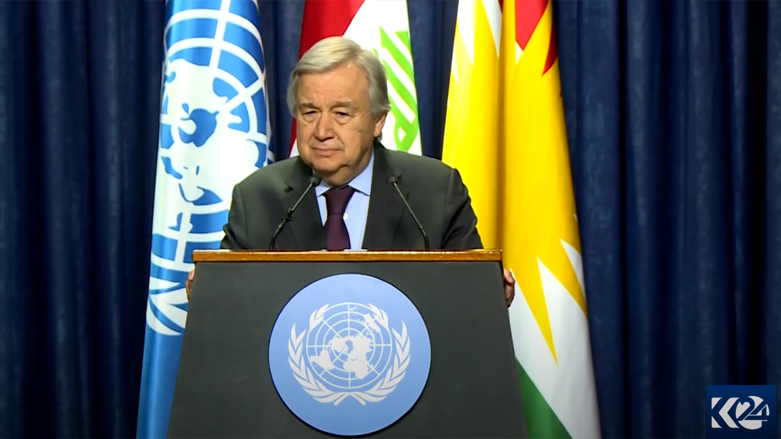UN chief ‘encourages’ Kurdish parties to hold elections in 2023

ERBIL (Kurdistan 24) – The United Nations chief, Antonio Guterres, on Thursday said he would encourage the Kurdistan Region parties to hold the sixth parliamentary election this year, during a press conference in Erbil.
Guterres’s press conference came after his meeting with Kurdistan Region President Nechirvan Barzani and Prime Minister Masrour Barzani in Erbil.
Following a short speech he delivered, the UN chief responded to questions from the members of the press on various topics, including the Erbil-Baghdad relations, the Sinjar Agreement, displaced Iraqis, and the Kurdish parliamentary elections.
“I encourage all political parties across the Kurdistan Region of Iraq to work together to ensure that the late parliamentary elections take place this year,” the UN official said in his speech at the beginning of the presser.
He said he urges all the parties to put the interest of the Kurdish people first.
“Good governance, respect for human rights and the freedom of expression, and inclusive political and electoral processes are bedrocks of stability and drivers of prosperity,” according to Guterres.
Due to political wranglings, the Region delayed its sixth parliamentary elections by a year.
Prime Minister Masrour Barzani and Kurdistan Democratic Party (KDP) President Masoud Barzani have that “no excuses” should be accepted to further delay the elections.
‘Kurdish generosity’
The UN official praised Kurdish solidarity and generosity to the vulnerable populations, including the Syrian refugees, Iraqi internally displaced people, and lately, the quake-affected Turkish and Syrian people.
“I was always deeply touched by the generosity and solidarity of Kurdish people towards those fleeing conflict and catastrophe,” the UN chief said.
The Kurdistan Region was among the very early responders to the devastating earthquakes that rocked both Turkey and Syria by dispatching medical, rescue, and search teams.
“Heartfelt thanks for the helping hand” that Kurdistan extended, he said.
Erbil-Baghdad relations
During his two-day visit to Iraq and its Kurdistan Region, Guterres met with numerous top officials from both federal and Kurdish governments and discussed the outstanding issues between them, including oil, gas, and the disputed territories.
He described the meetings as “fruitful” with the political figures of both capitals and expressed his hope that they are “determined” to overcome the outstanding differences.
“Moving from constant crisis management to structured institutionalized dialogue is in the interest and benefit of the all,” he added.
A number of issues require agreement, including the federal budget, oil and gas law, swift implementation of the Sinjar Agreement, and finalization of the Kirkuk dialogue, according to the official.
Erbil and Baghdad are currently engaged in a new round of talks on resolving the decade-old conflicts.
In response to a question of Kurdistan 24 regarding the Federal Supreme Court’s decisions against the Kurdish region’s financial entitlements, Guterres said that he had discussed all those issues with Iraqi officials, including the status of disputed territories between Erbil and Baghdad, as part of the constitution’s Article 140.
“I’m convinced that important progress is now entirely possible” and the “UN stands with the people of Kurdistan Region of Iraq to help build a better future they deserve,” he said.
“We will do everything we can to support these efforts,” to resolve the lingering issues between the two governments.
Syria’s Al-Hol Camp
The Kurdish-run Al-Hol Camp in northeastern Syria has become a major topic of concern for the members of the international community whose nationals are residing in the camp, which is suspected to have had ties with ISIS.
Iraq has repatriated hundreds of its citizens, who make up a great chunk of the displaced population, to a “rehabilitation and reintegration camp” in Nineveh province. Gutteres visited the camp on Thursday.
“Al-Hol can be a [ticking] time bomb”, he said, urging other countries to follow the example of Iraq in repatriating its citizens.
Kurdish tragedy
As a former head of the UN Refugee Agency known as UNHCR and a member of the political solidarity group with the Kurdish nation during the genocidal campaigns it suffered at the hands of former Ba’athist regime, the UN chief has become familiar with the Kurdish leadership.
“I was privileged to know very well and to become a friend of both [late] Jalal Talabani and Masoud Barzani, [whom] I have enormous respect for their contributions to the new Iraq and the progress of Kurdistan Region,” he said.
He hoped the political parties to be inspired by the “cooperation of these two great men to allow for this region to take profit as much as possible”, he added.
Sinjar Agreement
Erbil and Baghdad in September 2020 signed an UN-brokered agreement to normalize the administrative and security situation in the Yezidi-majority town of Sinjar following the ISIS occupation and genocide of its citizens in 2014.
The ongoing presence of militia forces has been one of the major hurdles that had hampered the implementation of the agreement, which aimed to facilitate the return of the displaced population.
“We are totally committed to the implementation of the Sinjar Agreement,” the UN official said.
“We know the obstacles and difficulties. We know the presence of armed groups there. But we believe the Sinjar Agreement can be implemented. And we believe it is fully essential to implement Sinjar Agreement,” he said.
